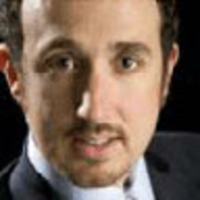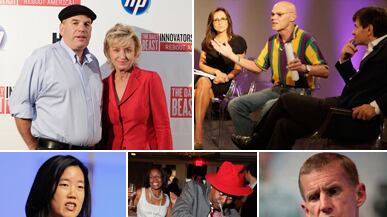From nobel economists to Facebook's cofounder to Gen. Stanley McChrystal, The Daily Beast Innovators Summit saw global idea leaders convene to find common causes—and solutions. Plus, read the Summit Cheat Sheet of innovative ideas from the weekend's participants.
"There was a time when America could summon all of her will, all of her might, all of her courage, all of her resources and do huge things…" said New Orleans Mayor Mitch Landrieu, his hoarse voice booming over the opening session of The Daily Beast's inaugural Innovators Summit. "This is a place where the country can learn to find herself again."
Gallery: The Daily Beast Innovators Summit in Pictures

And so 300 of the most influential people in the country gathered over the past three days in the Crescent City, just five years removed from the worst natural disaster in American history, to do just that. The mission, as outlined by the summit co-host, Daily Beast Editor-in-Chief Tina Brown, was a simple one: in a country where 17 million people are unemployed and confidence has eroded in long-respected institutions, let's figure out a way to bring together the leaders of every field, and reboot America.
And so came Nobel-winning economic experts, legendary financiers, swashbuckling entrepreneurs, a handful of mayors, a retired four-star general, a fashion legend, politicians, educators, non-profit pioneers and others to compare notes, offer lessons and swap ideas.
For three exciting days, that's what happened: a marketplace of ideas that created electric moments.
* After Glenn Hutchins, co-founder of private equity giant Silver Lake, laid out the crippling short and long-term problems America faces, the summit's gold-plated economic panel then set out to solve it. They didn't mince words. "The Chinese are more committed to capitalism than we are," historian Niall Ferguson declared at one point, as the attendees, convened on the Mississippi River, next to a warehouse full of Mardi Gras floats, buzzed. While deeply divided on the greatest threat to America—FDIC Chair Sheila Bair, former U.S. Budget Director Peter Orszag and Nobel economist Joseph Stiglitz cited jobs, while historian Ferguson, Hutchins and philanthropist Peter Peterson cited fiscal irresponsibility—a consensus began to gel around the idea of packaging a short-term infusion together with a long-term plan. "We behave like we can't walk and chew gum at the same time," says Peterson. Orszag, who helped Obama deploy the first stimulus bill, ageed that " it would be a mistake to enact a second package" without pairing it with a long-term roadmap. Hutchins, mindful that the reforms often come from crises, issued a call to arms: groups like those at the summit have to "shout from the rooftops."
* Sean Parker, the co-founder of Napster and Facebook, depicted by Justin Timberlake in The Social Network, donned a figurative pirate's outfit ("The ultimate answer is you have to accept that the war on piracy is a failure") as he espoused a culture of disruption. Sitting amid his digitally brilliant co-panelists including NBC's Lauren Zalaznick, advertising pacesetter Lori Senecal and HP's chief marketing officer Michael Mendenhall, he explained the philosophy of his new company, Spotify, which offers a closed, all-you-can-eat online music plan: "You have no choice. We've got you by the balls, you'll have to become a subscriber." Disruptive, indeed.
* Sitting under an outdoor tent, as giant containerized cargo ships moved up and down the Mississippi River, Barry Diller, CEO of The Daily Beast's parent company, IAC, provided a primer of management, as Ken Auletta asked him about his worst mistakes, including his opportunities to buy Paramount and AOL. Eventually, Auletta asked him about the recent negotiations between The Daily Beast and Newsweek.
The issue, he said, came down to control. "We got 50-50 economically, but 50-50 in terms of governance and all of that was not obtainable," he said, adding that it was "who, as George Bush said, is 'The Decider'…a real murky area to navigate."
"One way or the other," Diller added, "we'll either buy or create some form of print product. As much as digital of course is going to take more and more share, advertisers like to have a print representation of what they're trying to say, if it's tied well and into this very fast-moving Internet publication."
* In his first interview since he was ousted from his position leading the war in Afghanistan, General Stanley McChrystal made news, slamming WikiLeaks' most recent document dump: " I think it's sad." Of the "decision by anybody to leak classified information," McChrystal added not only is it illegal, but it involves "threats to comrades," terming it "a level of irresponsibility that's very upsetting," and said that while "I can't judge every single piece of information," the threats posed to U.S. soldiers and allies has to be balanced with "the need or right to know."
McChrystal now teaches a graduate class on leadership at Yale, and provided a taste of that, running Ferguson, JetBlue founder David Neeleman, D.C. schools chancellor Michelle Rhee and dealmaker Teddy Forstmann through his Leadership Lab. The general aired an intriguing idea of his that he calls "plywood leadership," in which the leader is the glue that binds the planks together, producing something whose strength and efficiency is far greater than the sum of its parts.
Each plank of low-grade wood is pretty ordinary: "You can break it with your fingers," the famously athletic general said. But glued together, it's "unbreakable." Ferguson later quipped, "Better plywood leadership than deadwood leadership!" McChrystal was fast on his feet, too: when Rhee was talking about being publicly ousted from her most recent job, his rejoinder: I understand something about that.
* Back at the Hotel Monteleone, in the historic French Quarter, the topic was education reform, as Steve Brill moderated all-star panel—Rhee, New York City Schools Chancellor Joel Klein and Louisiana schools Chief Paul Pastorek—that lit into the status quo. "What I am against is not teachers, it is the systems that allow poor teachers to get raises every year despite the fact they aren't performing," Rhee declared. "We have to have a national agenda. Whether I'm the right person to lead that—I'm not sure. Clearly I haven't created the best of friends."
"Somebody's got to read Machiavelli!" added Klein. "The defenders of the status quo aren't stupid, they understand the benefits," he said, adding that it's the disrupters who are paying an immediate price for the benefit of others down the line.
The real stars throughout the three days were the grassroots innovators who relayed their stories of taking ideas and putting them into action.
The summit's political panel featured all manner of more star power: George Stephanopolous, Harold Ford Jr., James Carville, Leslie Sanchez, and The Daily Beast's own Howard Kurtz gave their takes on 2010 and beyond. But the real stars throughout the three days were the grassroots innovators—dozens of them—who relayed their stories of taking ideas and putting them into action. The mayors who turned around the world's cocaine capital ( Medellin) and a dying steel town ( Braddock, Pennsylvania). The woman, Connie Rice, taking on Los Angeles' gangs. The man, Marc Koska, whose bull-headed development of the single-use needle saved the lives of thousands. And dozens more, including a slew of social entrepreneurs reinventing New Orleans. (On Saturday, founding sponsor HP announced a surprise $100,000 grant to support such efforts.)
Indeed, the city fed the energy, providing a vibrant canopy. Feathered Mardi Gras Indians marched attendees into the first session. Kermit Ruffins, Wendell Pierce and other jazz greats behind HBO's hit Treme discussed—and displayed—how culture can drive innovation. Still other attendees toured the Broadmoor district and the Lower Ninth Ward, which are being reimagined—and reborn. A powerful mix, and perhaps a beginning as America rises up to the challenges it faces.
Randall Lane is editor at large at The Daily Beast. The former editor in chief of Trader Monthly, Dealmaker and P.O.V. magazines, and the former Washington bureau chief of Forbes, he is the author of The Zeroes: My Misadventures in the Decade Wall Street Went Insane.






